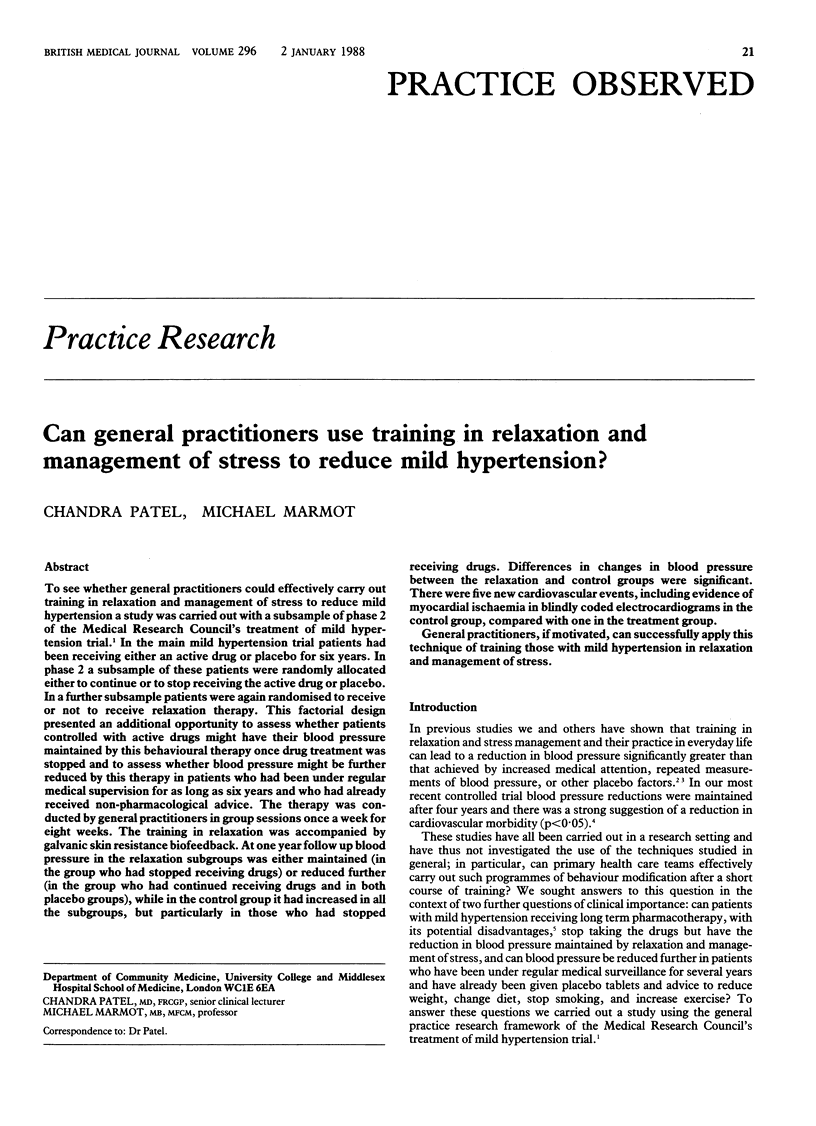Abstract
To see whether general practitioners could effectively carry out training in relaxation and management of stress to reduce mild hypertension a study was carried out with a subsample of phase 2 of the Medical Research Council's treatment of mild hypertension trial.1 In the main mild hypertension trial patients had been receiving either an active drug or placebo for six years. In phase 2 a subsample of these patients were randomly allocated either to continue or to stop receiving the active drug or placebo. In a further subsample patients were again randomised to receive or not to receive relaxation therapy. This factorial design presented an additional opportunity to assess whether patients controlled with active drugs might have their blood pressure maintained by this behavioural therapy once drug treatment was stopped and to assess whether blood pressure might be further reduced by this therapy in patients who had been under regular medical supervision for as long as six years and who had already received non-pharmacological advice. The therapy was conducted by general practitioners in group sessions once a week for eight weeks. The training in relaxation was accompanied by galvanic skin resistance biofeedback. At one year follow up blood pressure in the relaxation subgroups was either maintained (in the group who had stopped receiving drugs) or reduced further (in the group who had continued receiving drugs and in both placebo groups), while in the control group it had increased in all the subgroups, but particularly in those who had stopped receiving drugs. Differences in changes in blood pressure between the relaxation and control groups were significant. There were five new cardiovascular events, including evidence of myocardial ischaemia in blindly coded electrocardiograms in the control group, compared with one in the treatment group.
General practitioners, if motivated, can successfully apply this technique of training those with mild hypertension in relaxation and management of stress.
Full text
PDF



Selected References
These references are in PubMed. This may not be the complete list of references from this article.
- Johnston D. W. Psychological interventions in cardiovascular disease. J Psychosom Res. 1985;29(5):447–456. doi: 10.1016/0022-3999(85)90078-9. [DOI] [PubMed] [Google Scholar]
- Patel C., Marmot M. G., Terry D. J., Carruthers M., Hunt B., Patel M. Trial of relaxation in reducing coronary risk: four year follow up. Br Med J (Clin Res Ed) 1985 Apr 13;290(6475):1103–1106. doi: 10.1136/bmj.290.6475.1103. [DOI] [PMC free article] [PubMed] [Google Scholar]
- Rose G. Strategy of prevention: lessons from cardiovascular disease. Br Med J (Clin Res Ed) 1981 Jun 6;282(6279):1847–1851. doi: 10.1136/bmj.282.6279.1847. [DOI] [PMC free article] [PubMed] [Google Scholar]


